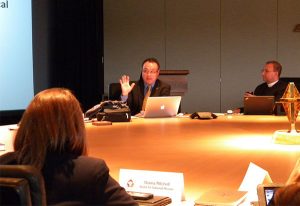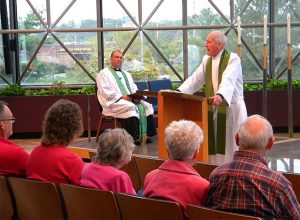By Joe Isenhower Jr. (joe.isenhower@lcms.org)
ST. LOUIS — Synod President Rev. Dr. Matthew C. Harrison’s observation at the Sept. 9-10 LCMS Board for National Mission meeting here that “it’s a good moment in the Synod” set the tone for other presenters and the meeting itself.
In addition to continuing its work on policies for itself and the Synod’s Office of National Mission (ONM) and adopting several resolutions, the Board heard of challenges and opportunities from LCMS Chief Mission Officer (CMO) Rev. Kevin Robson; ONM Executive Director Rev. Bart Day; leaders of several ONM ministries; the Rev. Kou Seying, who joined the Concordia Seminary, St. Louis, faculty this year as the Lutheran Foundation professor (and dean) of Urban and Cross-Cultural Ministry; and the Rev. Randall Golter, who is spearheading the Synod’s observance of the 500th anniversary of the Reformation and its “Preach the Word” initiative.

“It’s very calm in the church,” Harrison told the board, as he noted that the “stark realization of the quick change of our country away from Christian influence, morality and values is enormously challenging but of benefit to the Missouri Synod because it will do more to unite us.”
He likened today’s “challenges” of legalized same-sex marriage and homosexual rights and the prospect of the Synod facing legal challenges because of its strong, scriptural one-man/one-woman understanding of marriage to the continuing pushback to the Roe v. Wade decision that legalized abortion 40-plus years ago.
“The fight is not over because of pro-life lawyers and institutions,” Harrison said. “It’s the same that we’ll experience with the marriage decision. … These challenges will be coming, but we will make the best of them.”
Of the international scene, Harrison pointed out how pockets of “substantial numbers of Lutherans are taking a biblical and confessional stand” against same-sex marriage after formerly being tied to more liberal Lutherans who advocate it — in Scandinavia and elsewhere in Europe, as well as in Africa.
Harrison also spoke of the 35 “calm and good” LCMS district conventions this year and his being able to attend 21 of them, with Synod vice-presidents representing him at the 14 others.
Robson ‘assimilating’
Robson, who began in the CMO position earlier this year, said that his own challenge of “assimilating into the work” of the Synod has been eased through “introductory interviews with about 100 people here at the [LCMS] International Center — finding out what they’re doing and what their expectations of the CMO are.”
“It’s been delightful,” Robson said of those conversations with “people who are very strongly committed to our Lutheran identity and our stand on Scripture and the Lutheran Confessions, while being strongly committed to the Gospel and expanding the Kingdom of God. … I’ve been absolutely awed and inspired by the faithfulness, devotion and capacity in this building and the level of commitment and fervent desire to do our work together well.”
Robson also spoke of the “desire to increase transparency and effectiveness of communications with each other” among Synod staff members.
Day on ONM
Day reported that five women have joined the ONM staff since the board previously met last spring:
- Director of Christian Education (DCE) Julianna Shults, the new program manager of Lutheran Young Adult Corps (formerly Lutheran Youth Corps).
- DCEs Kyla Rodriguez and Robyn Armbrust — both full time (temporary) — who support the registration process for the 2016 LCMS Youth Gathering;
- Stephanie Neugebauer, in the position of director of Life and Health Ministries; and
- Deaconess Maryann Hayter, who works with ONM Director of Witness and Outreach Rev. Mark Wood in developing resources for “Revitality!” and a new lay-evangelism program for the Synod. Revitality! — also a new program of the department — is being developed to support congregation revitalization.
Day also outlined ONM’s “Mission Field: USA” initiative, which is launching with three domestic missionaries. Pastors and locations for two of those sites have already been identified (Philadelphia and Toledo, Ohio) and a third site (Brownsville, Texas) is in final stages of planning with the LCMS Texas District.

Ministry reports
ONM ministry directors who made presentations to the board were:
- Neugebauer, who was installed a week and a half after the Sept. 25 death (from cancer) of former Life and Health Ministries Director Dr. Maggie Karner. (See related story here.)
“I’m absolutely humbled to be here in Maggie’s place,” said Neugebauer, describing Karner as “an amazing person.”
Neugebauer outlined for the board all that LCMS Life and Health Ministries addresses.
For Life Ministry, she said that is not just abortion, but end-of-life issues “and everything in-between.” Health Ministry is made up of domestic and international components for service and care.
- Rev. Dr. Roosevelt Gray, director of LCMS Black Ministry.
Gray spoke of the Rosa J. Young film project and a number of premieres set for the film “The First Rosa,” and its planned release throughout the Synod next year. The film details the impact that the late Dr. Rosa Jinsey Young had in the establishment of Lutheran schools and congregations in Alabama throughout the first half of the 1900s.
Gray also told the board of plans for establishing Rosa J. Young International Academies — charter schools that carry out the mission of the academies “to provide the educational, social and emotional pillars upon which academically excellent servant leaders are developed in a safe, supportive and nurturing learning community.”
- Deaconess Kim Schave, chair of the Synod’s Task Force on Domestic Violence and Child Abuse, told the board about the resources available from the task force, which recently conducted a free first-time workshop at Concordia Seminary, St. Louis. Plans call for similar free workshops next year — April 9 (on domestic abuse) and April 23 (on child abuse) at Concordia Theological Seminary, Fort Wayne, Ind. Schave, formerly on the ONM staff, is now director of project and policy administration in the Synod’s Office of the Chief Administrative Officer.
Challenge: cross-cultural work
Seying laid out the challenges of cross-cultural ministry in the Synod, beginning with statistics including that the U.S. foreign-born population is now at 45 million and that within this century, there will be no majority [ethnic] group in America. He also revealed a recent finding of the Pew Research Center that in terms of membership of major Christian churches in the country, the Synod is among the three that are “least diverse.”
“Theological education across cultures is a must,” Seying told the board, adding that it must have “a biblical, confessional theological foundation,” and should involve “cultural analysis, historical perspective and contemporary strategies.”
He said the greatest needs of the Synod and its seminaries in cross-cultural education are “a new, effective curriculum with learning technology in mind and theological resources for specific languages, personnel resources and financial resources.”
“What a wonderful time to be in mission, to be in the church,” Seying said. “The opportunity to share the Gospel has never been this grand in the history of mission. … We must take that which is so rich in our church body — and take that to the people. We must teach biblical Christianity with relevancy. And we must remember that in any theological-education approach, Christ must be at the center.”
Reformation anniversary, preaching
Golter also spoke of relevancy in his presentation about the Reformation anniversary and the “Preach the Word” initiative.
He reminded the board that the “It’s Still All About Jesus” theme for the Synod’s anniversary observance was at the heart of Reformer Martin Luther’s message for conscience-bothered individuals of his time, as it remains the relevant key message for such people today.
“It’s not about Luther,” Golter said, “but about the One who forgave Luther and the One who liberated Luther from a bound conscience to a freed conscience.”
He outlined the various plans and suggestions for observing the anniversary in the Synod — which are found or will be available online at the new website lutheranreformation.org.
Golter also noted the relevant tie of the Reformation-anniversary observance to “Preach the Word.”
He emphasized that Luther knew and practiced the value of “proper preaching and care for souls.”
“If preaching the Word is fundamental to the life of the church and the life of the church’s mission,” he asked, “why not use this as one way to honor the Reformation by the pastors — if they desire — to improve their craft of preaching and the laity in their vocation of hearing a sermon?”
To attain those goals, the preaching initiative will include modules for pastors, with the first modules scheduled for launch next September. Those pastors might then share with members what they’ve learned in the modules.
Policies, actions
In policy work, the board heard from Day about continued work to develop the process for monitoring its policies. The BNM also discussed goals to accompany its general policies and policies in the area of witness.
Among action items, the Board for National Mission:
- approved setting up a central “public” email address to receive inquiries and messages — bnm@lcms.org.
- designated Board Chairman Rev. Steven Briel as its advisory delegate to the 2016 Synod convention.
As the meeting drew to a close, Briel thanked the other board members “for all your work, including your commitment and enthusiasm for the Lord’s mission and LCMS National Mission.”
The next meeting of the BNM is set for Feb. 12-13, also in St. Louis.
Posted Oct. 21, 2015 / Updated Oct. 26 and Nov. 5, 2015



